2019 Mazda CX-5 Review and Buying Guide | The driver’s choice
https://ift.tt/2q0Ov1W
The 2019 Mazda CX-5 stands out in an ever-expanding field of similarly sized compact crossovers. There are several good options for shoppers looking to replace the traditional family sedan with something that sits up a little higher and offers some added utility via a reasonably sized open cargo area instead of a closed-off trunk. But if you really enjoy spending time behind the wheel, there isn’t a small crossover that can match the Mazda CX-5’s blend of excellent driving dynamics, practicality and affordability. For that reason, we’d suggest that everyone shopping in this segment should take the CX-5 for a test drive.
What’s new for 2019?
The CX-5 gets its first significant update since being completely redesigned for 2017. There are two new engine choices. A 2.5-liter turbocharged four-cylinder is the more powerful option the CX-5 has always needed, while the new 2.2-liter diesel engine is the answer for those who want better fuel economy.
Every CX-5 benefits from a retuned suspension setup and Mazda’s G-vectoring Control Plus system, which are intended to improve the 2019 CX-5’s handling. A revised infotainment system loses its touchscreen capability but now offers Apple CarPlay and Android Auto capability (it is not, however, the all-new and greatly improved system found in the Mazda3). Also new for 2019 is a top-spec Signature trim level that adds a layer of wood and chrome trim to the interior to go along with attractive brown leather upholstery and a 360-degree camera monitor. A set of 19-inch Dark Silver aluminum wheels and unique badging round out the noteworthy Signature upgrades.
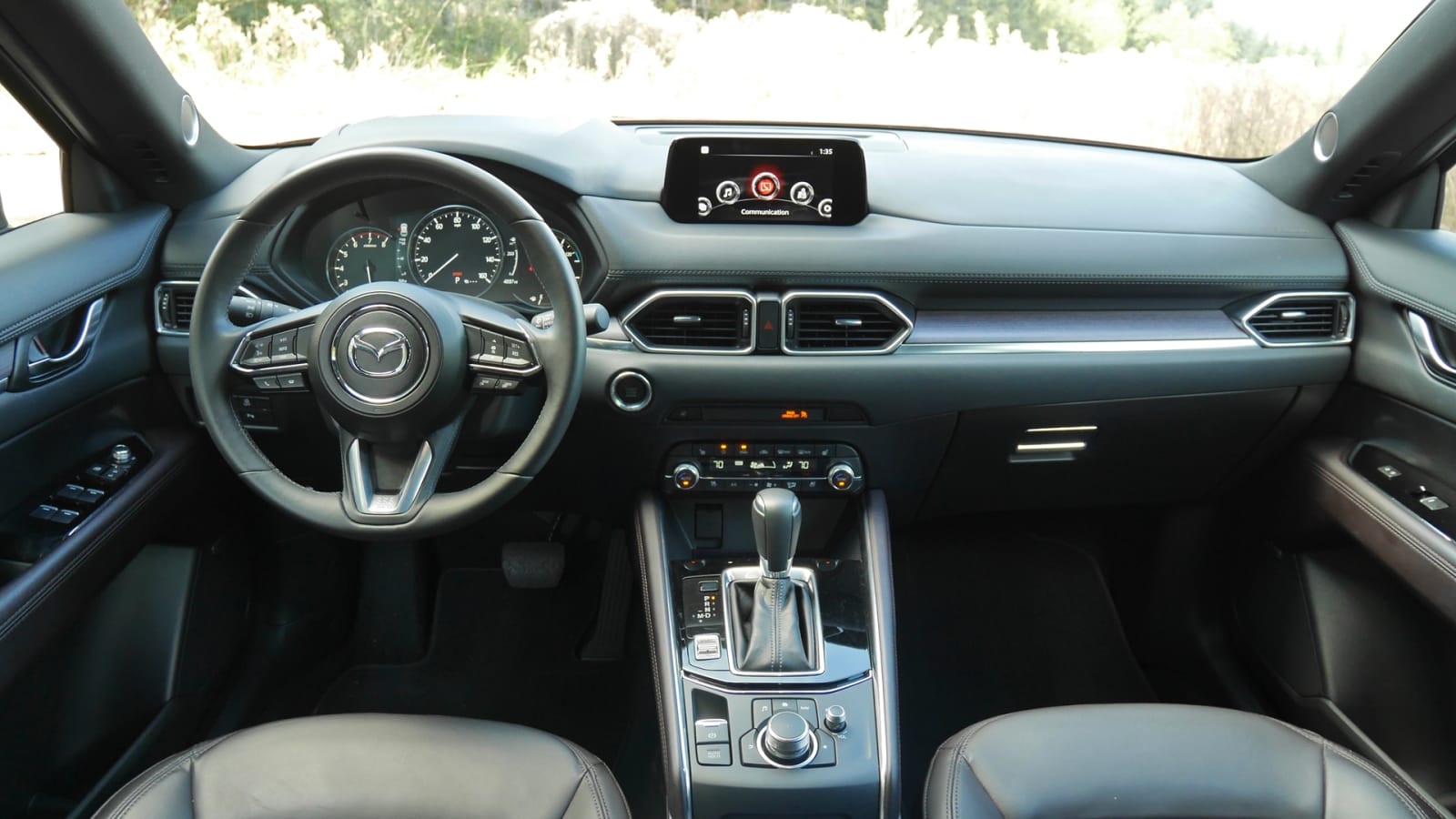
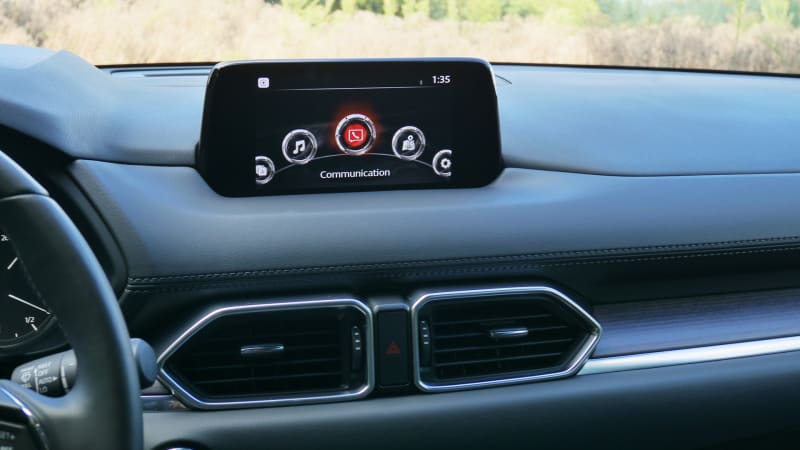
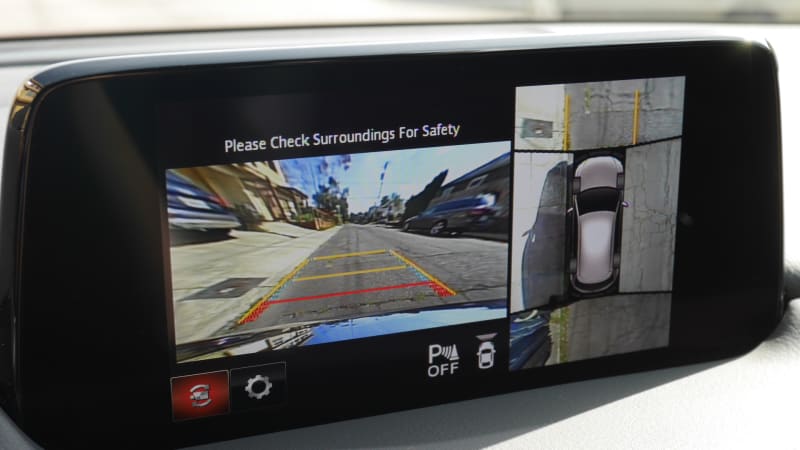
What’s the CX-5’s interior and technology like?
The CX-5 boasts a handsome, upscale design with materials to match. The cabin conveys the more premium vibe that Mazda is increasingly shooting for – it also makes a more emotional connection than the typical cardboard box on wheels. Its top two trim levels, Grand Touring Reserve and Signature, boast seats that are heated all around and ventilated up front, covered in high-quality leather with contrast French stitching. There’s stitching on the dash too, though it goes through rubbery stuff. The padded and stitched pleather on the doors and center console are a nicer touch, as is the subtle dark wood and alloy trim – especially the air vents that seem to jut out from within the dash. Admittedly, these fancier touches are absent on lower trims, but the overall vibe remains more premium and stylish than those of most competitors.
Sitting atop the dashboard is a centrally mounted 7.0-inch screen that runs Mazda’s sixth-generation infotainment system. The screen would benefit from increased resolution, an issue that is particularly noticeable when looking at the rearview camera. The CX-5’s commander dial is fairly intuitive and easily navigable by feel, but some drivers may prefer a touchscreen infotainment system, especially when using Android Auto and Apple CarPlay integration that comes standard equipment on all but the base CX-5 Sport trim level. Mazda offers a much improved seventh-generation infotainment system in its latest Mazda3, and we hope it spreads across the brand’s lineup soon.
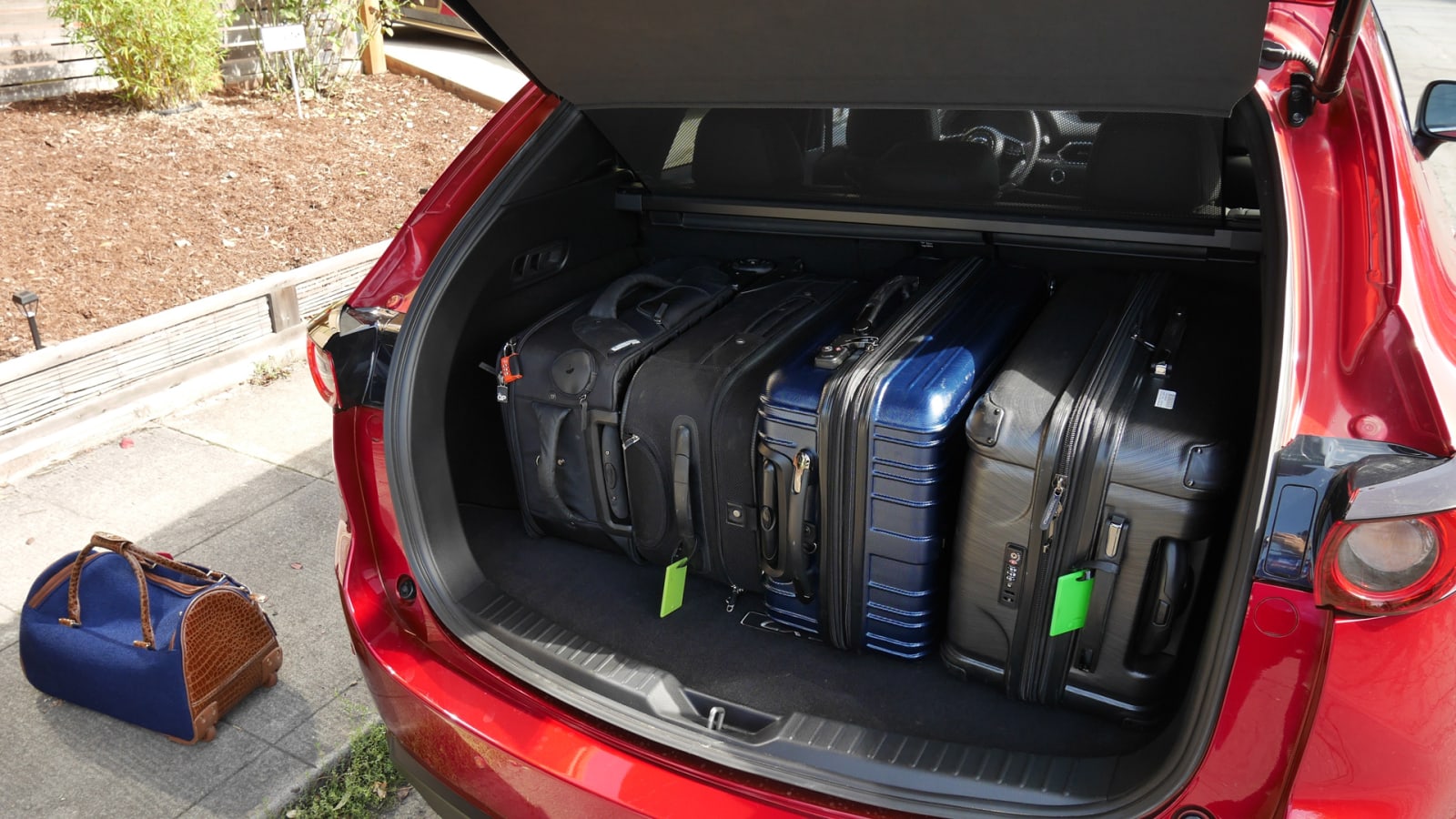


How big is the CX-5?
The CX-5 is just about midpack in overall interior space. Basically, there should be adequate space inside for four occupants to ride around in relative comfort and to haul enough stuff for an extended weekend trip.
The CX-5 has 30.9 cubic feet of space behind its raised back seat, which on paper is considerably less than its top competition. The Toyota RAV4 and Honda CR-V both have 37.6 cu-ft, while the Subaru Forester has between 33 and 35 depending on options. Put the second row of seats down and there’s a maximum of 59.6 cubic feet of space available, which again falls far short of the segment-leading Honda CR-V (75.8 cu-ft max). Still, most other competitors have as much or less cargo space than the CX-5.
To give you an idea of whether it’ll be enough for you, here’s a real-world look at how much stuff will fit into the cargo area of the Mazda CX-5. Spoiler alert: It’s probably big enough for the couples and small families it’s designed to appeal to.

What’s the CX-5’s performance and fuel economy?
There are three engine options available, all of which are paired to a six-speed automatic transmission.
Most trim levels come standard with the base 2.5-liter four-cylinder, which produces 187 horsepower and 186 pound-feet of torque. Front- and all-wheel drive are available. Fuel economy is 25 mpg city, 31 mpg highway and 28 mpg combined with standard front-wheel drive, and 24/30/26 with optional all-wheel drive.
The new 2.5-liter turbocharged four-cylinder comes standard on the Grand Touring Reserve and new Signature trim levels. It produces 250 hp and 310 lb-ft, and is exclusively paired to all-wheel drive. That output makes it the segment hot rod. Besides laying waste to similarly-priced rivals in its class, it outguns those in the pricier luxury midsize SUV segment as well. The BMW X3 and Porsche Macan start at 248 hp, and the Mercedes GLC 300 at 241. Fuel economy stands at 22/27/24.
Optional on only the Signature trim, the 2.2-liter turbocharged diesel engine offers 168 hp and 290 lb-ft. Fuel economy stands at 28/31/29 with front-wheel drive (it’s 1 mpg lower in each cycle with AWD), which is only a tiny bit better than the base engine, and owners will have to offset any mpg gains with the price of diesel fuel in their area. Ultimately, we don’t think the diesel is very compelling in the CX-5 and would recommend that efficiency-minded buyers either stick with the base engine or consider a hybrid-powered rival SUV.
What’s the CX-5 like to drive?
Mazda’s compact crossover is perfect for the person whose life changes have dictated the switch from an agile car to some sort of family hauler. Its spot-on steering and throttle response evoke Porsche, while the six-speed automatic transmission favors performance over fuel economy (while still getting relatively good fuel economy). Those dynamic elements, plus a carefully crafted, ideal driving position should make the CX-5 feel “just right” for those used to more sporting, non-family-oriented transport.
Part of its dynamic prowess comes from the fact that G-Vectoring Control Plus, technology exclusive to Mazda, uses engine torque to shift weight onto the front wheels just as turn-in is initiated. That provides more grip on the turning wheels, and while it’s most noticeable in poor road conditions, it further instills the driver with a calm assurance on the curviest of roads even when surfaces are dry. It can also apply the outside wheel’s brake, which guides the vehicle with the sort of smooth control typically reserved for sports sedans.
Where can I read more about the Mazda CX-5?
Driving the CX-5 and CR-V back-to-back, comparing their driving experiences, interiors and specs.
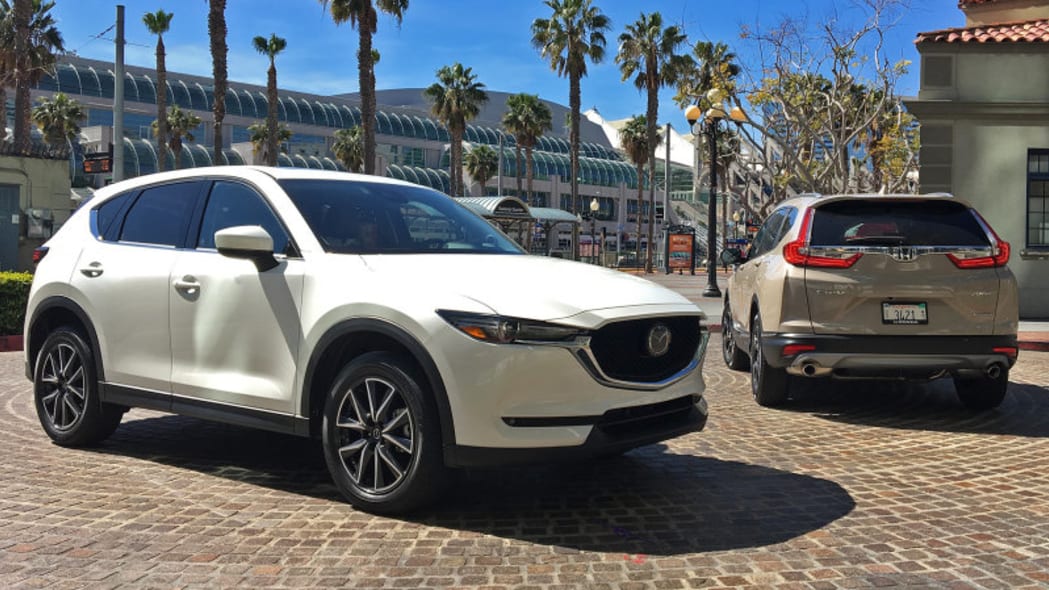
Our first time driving the new, very welcomed turbocharged Mazda CX-5, including information about it performance and engineering.
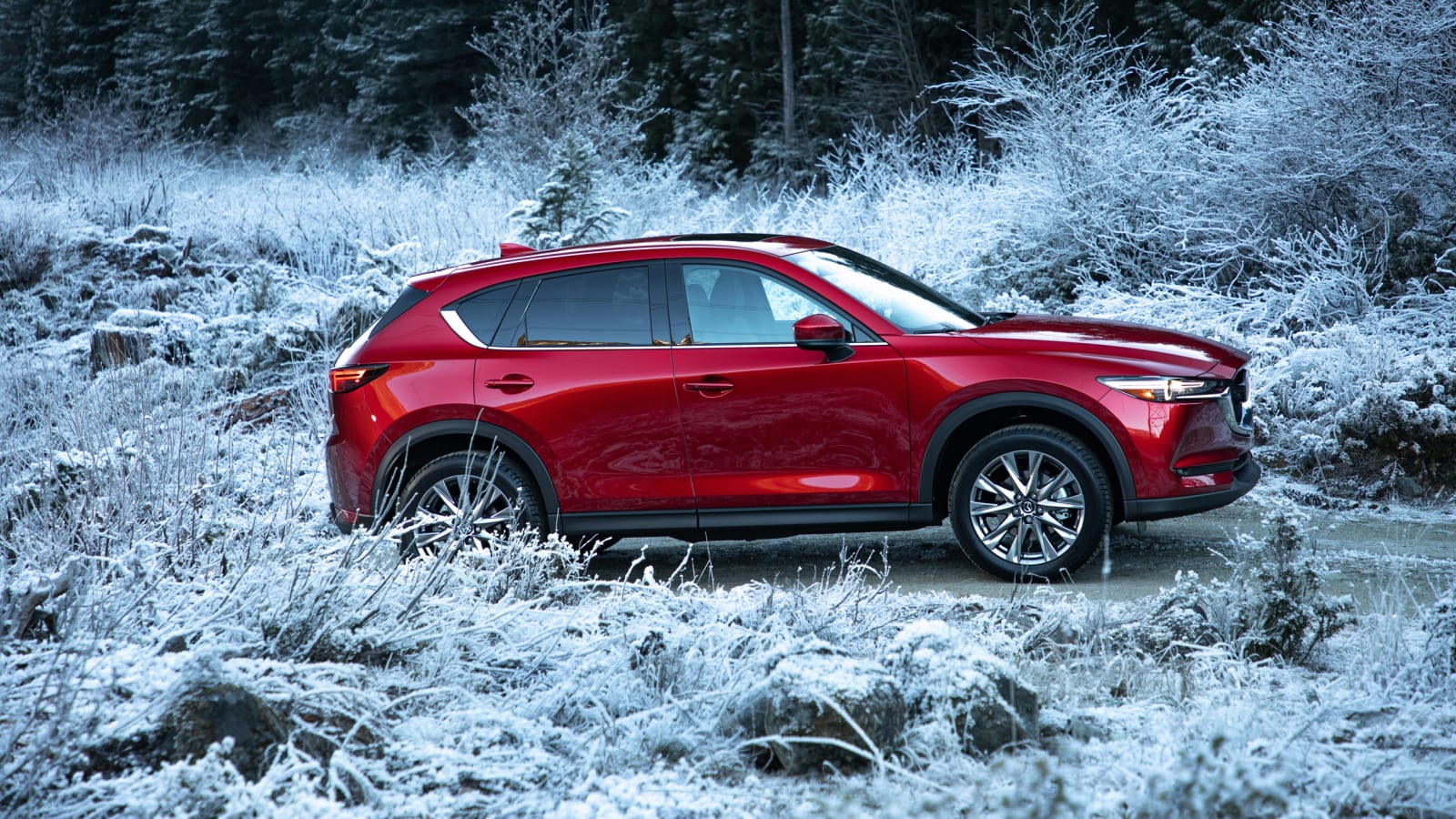
“The Mazda CX-5 was already a contender for being the best-driving compact crossover, but this turbo engine clinches it. The throttle response is impressively quick and boost comes on so smoothly. The bountiful torque makes it a blast when squirting through traffic and blasting out of corners.”
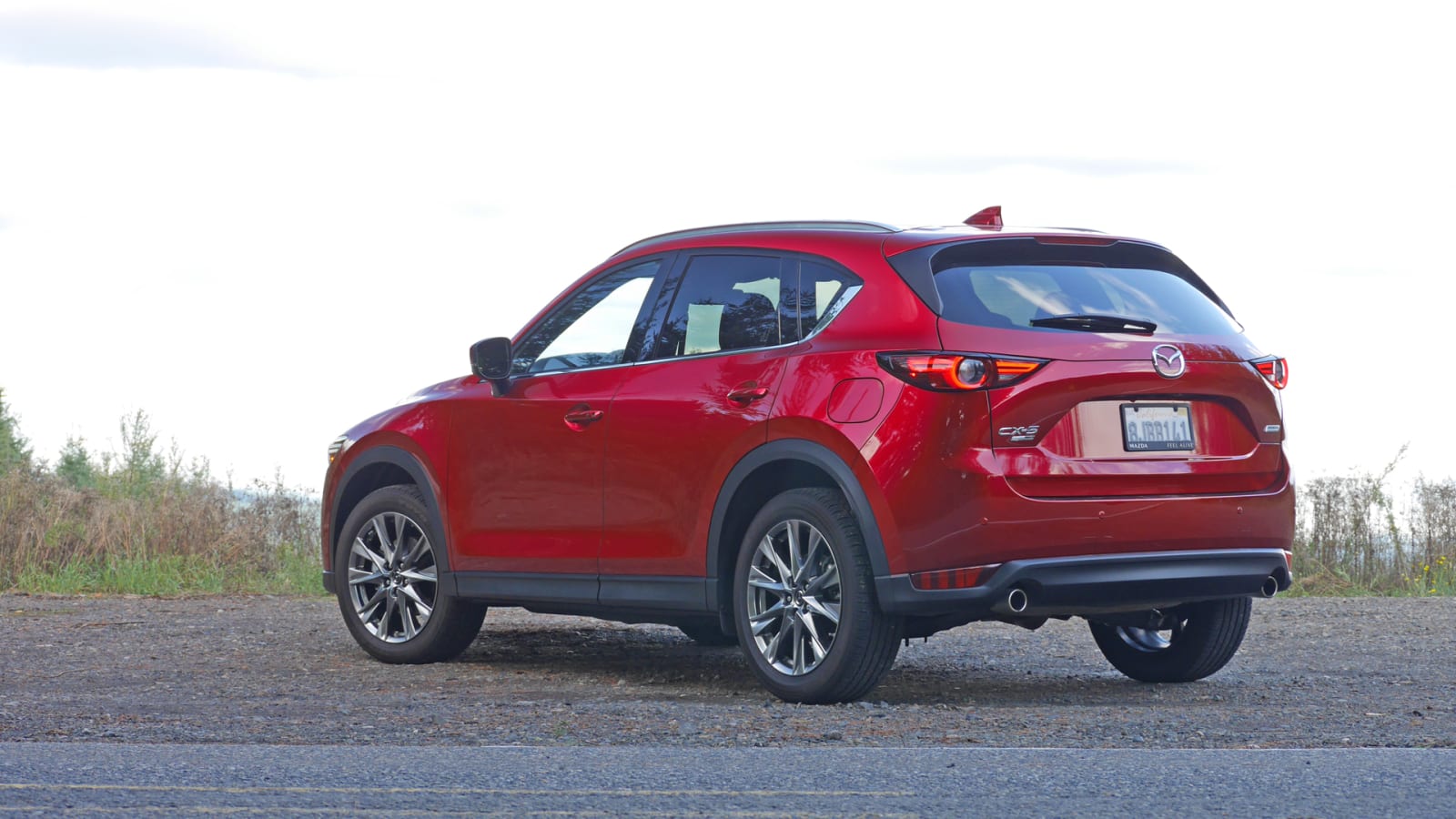
See how much luggage can fit in the CX-5’s cargo area.
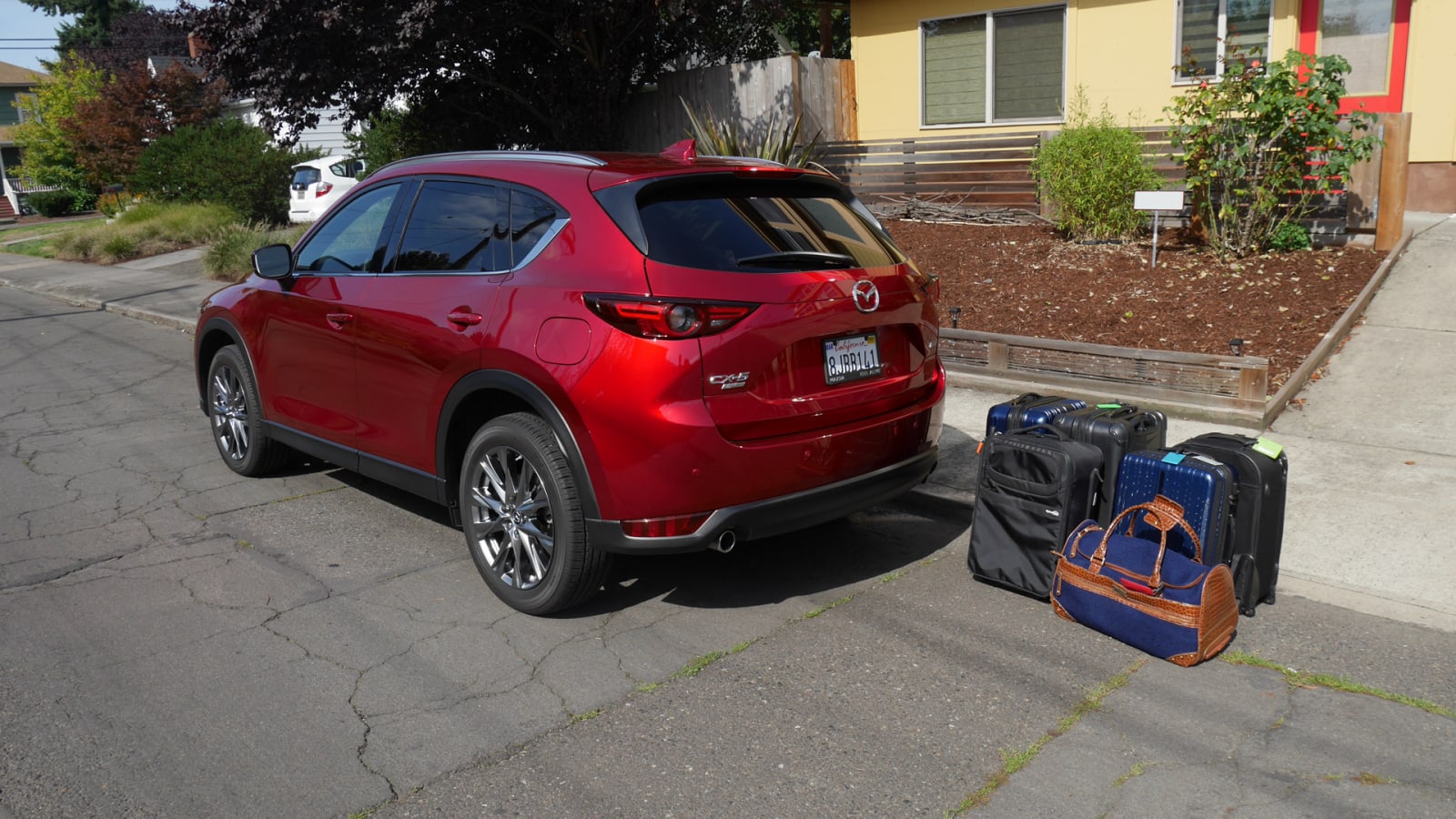
What features are available and what’s the CX-5’s price?
In addition to the three engine choices, the Mazda CX-5 is offered in five trim levels. You can find a full breakdown of their respective features, specs and local pricing here on Autoblog, and we’ll go over the asking prices of each below. You should know, though, that the Skyactiv-D diesel is offered as an option on only the top-level Signature for $42,045. That makes it the priciest CX-5 that Mazda offers and further erodes its desirability.
All-wheel drive adds $1,400 to the Sport, Touring and Grand Touring prices cited below. (The Reserve and Signature come standard with AWD and the more powerful engine). All prices below include a $1,045 destination fee.
- CX-5 Sport: $25,395
- CX-5 Touring: $27,660
- CX-5 Grand Touring: $31,090
- CX-5 Grand Touring Reserve: $35,915
- CX-5 Signature: $37,935
What are the CX-5’s safety equipment and crash ratings?
The CX-5 comes standard with all the airbags and stability aids buyers have come to expect, along with rear cross traffic alert. Blind spot monitoring, a radar-based adaptive cruise control system, lane departure warning, lane-keep assist and pedestrian detection are added starting with the Touring trim. Some or all of these features come standard on competitor SUVs.
The National Highway Traffic Safety Administration gives the CX-5 a perfect five-star overall safety rating, and the Insurance Institute for Highway Safety bestows its highest Top Safety Pick+ award to models equipped with adaptive front headlights.
Auto Blog
via Autoblog https://ift.tt/1afPJWx
October 11, 2019 at 12:33PM